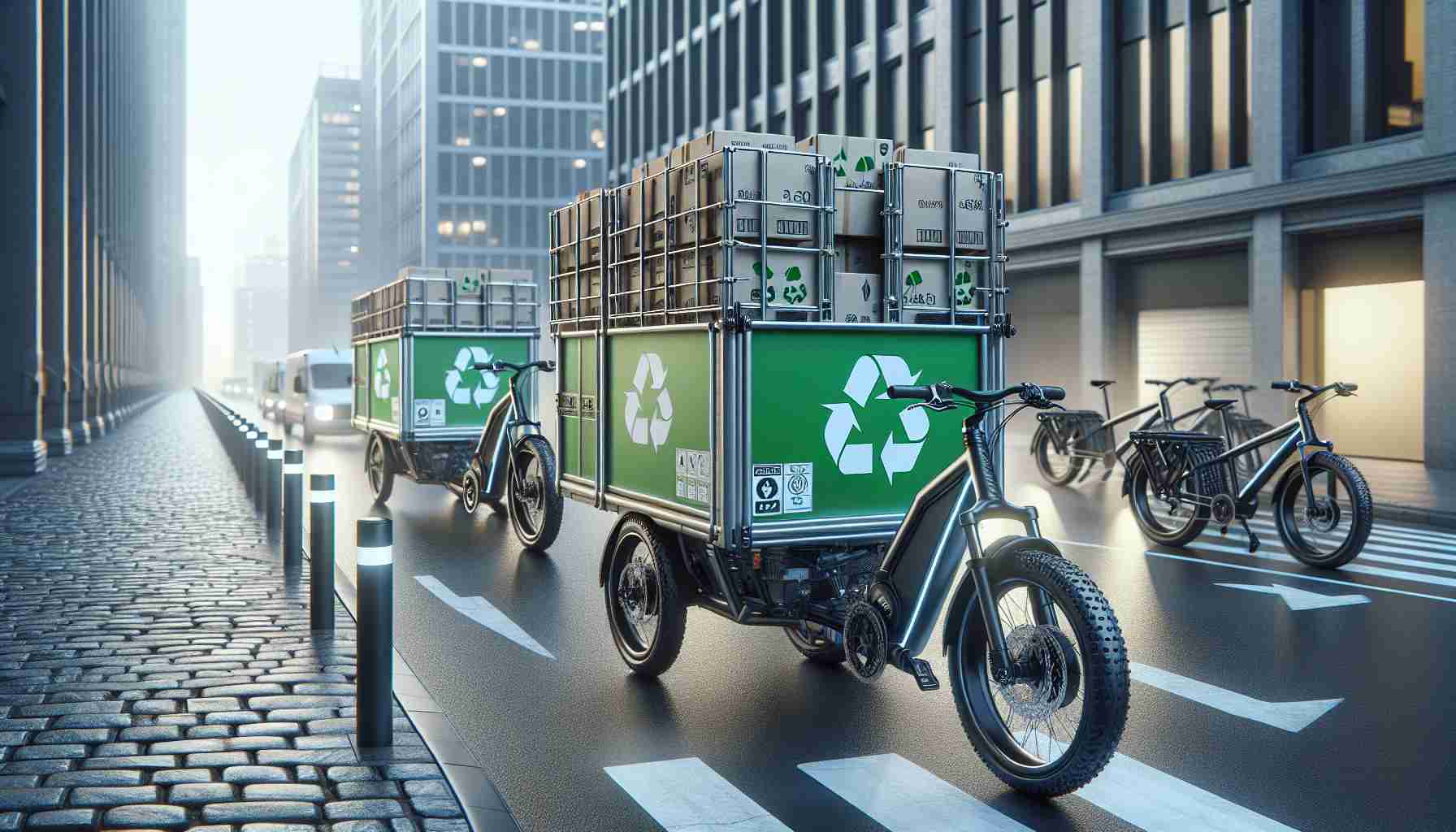As cities around the world grapple with increasing congestion and environmental concerns, the conventional cargo bike market is emerging as a promising solution for sustainable urban transportation. These pedal-powered workhorses are not just a relic of the past; they are poised to play a critical role in the future of logistics and personal transport.
Why Now? The renewed interest in cargo bikes is fueled by a combination of technological innovations and a growing emphasis on sustainability. Modern cargo bikes are equipped with lightweight materials, GPS tracking, and electric assist options, making them more efficient and versatile than ever before. These advancements are attracting the attention of logistics companies looking to reduce carbon footprints and bolster last-mile delivery solutions.
Market Growth and Potential In 2023, the global cargo bike market is projected to exceed $2 billion, with Europe and North America leading the charge. With governments offering incentives for green vehicles and urban planners prioritizing bicycle-friendly infrastructure, the potential for growth is immense. Cargo bikes could feasibly replace vans and trucks for many urban delivery tasks, reducing traffic and lowering emissions.
Future Innovations Looking ahead, the integration of IoT technology into cargo bikes could revolutionize fleet management, providing real-time data on location, load, and condition. Moreover, the rise of shared cargo bike services could democratize access, making these bikes a staple in urban transport networks.
In conclusion, as the world shifts toward sustainability, the conventional cargo bike market is not just an alternative; it’s a burgeoning industry with the potential to redefine how we navigate our cities.
The Role of Cargo Bikes in Shaping Future Urban Landscapes
As urban areas worldwide confront mounting congestion and environmental challenges, cargo bikes emerge as a beacon of sustainable urban transportation. These pedal-powered vehicles are no longer relics of the past but essential components of future-centric logistics and personal transportation systems.
Environmental Impacts
Cargo bikes offer a significant eco-friendly alternative in urban logistics, primarily due to their low carbon footprint. Unlike traditional delivery trucks and vans, cargo bikes do not emit harmful greenhouse gases, significantly reducing air pollution in densely populated areas. This cleaner mode of transport contributes to improving urban air quality, crucial for combating climate change and promoting public health. By alleviating pollution, cargo bikes help protect biodiversity and reduce urban heat, smoothing the transition toward more sustainable cities.
Impact on Humanity and City Living
Cargo bikes have the potential to transform urban living by reducing congestion, which improves quality of life in cities. Streets can become less crowded, and public spaces more enjoyable without the heavy traffic that trucks contribute to. The adoption of cargo bikes fosters a healthier lifestyle by encouraging physical activity both for the riders and in the general urban environment. Milling through city streets on a cargo bike can improve mental well-being and community interaction, enhancing the vibrancy of urban neighborhoods.
Economic Influence and Future Prospects
The economic implications of cargo bikes are vast. The market’s projected valuation of over $2 billion in 2023 signals its burgeoning economic role. Governments offering incentives and investment in bike-friendly infrastructure attract businesses and logistics companies to transition their fleets to cargo bikes, cutting down operational costs associated with fuel and maintenance. This transition could revitalize urban economies by creating new business opportunities in bike manufacturing, maintenance, and shared service platforms.
Looking to the future, the integration of Internet of Things (IoT) technology promises to further boost the efficiency of cargo bikes. Real-time data collection on parameters like location, load, and condition will optimize logistics, reducing waste and enhancing service reliability. Additionally, the rise of shared cargo bike programs can make this sustainable option more accessible to urban residents, supporting equity in transportation.
Connecting to the Future of Humanity
In the grand landscape of futuristic urban planning, cargo bikes represent a pivotal shift towards sustainable, human-centered cities. As urban populations swell, the need for efficient, eco-friendly, and cost-effective transportation solutions will only grow. The widespread adoption of cargo bikes could herald the onset of urban environments where air is cleaner, streets safer, and mobility accessible to all, setting a benchmark for global urban development. This transition will resonate far beyond transportation, influencing housing, commercial activity, and even social interactions — ultimately shaping the trajectory of human living in harmony with the planet.
The Rise of Cargo Bikes: Shaping the Future of Urban Mobility
As cities strive to mitigate congestion and environmental challenges, the cargo bike market is emerging as a key player in the future of sustainable urban transportation. With their blend of tradition and innovation, cargo bikes are poised to transform logistics and personal transport.
The Technological Edge
Modern cargo bikes are a far cry from their predecessors. Today’s models feature cutting-edge materials, integrated GPS systems, and electric assist technologies. These advancements enhance their efficiency and adaptability, attracting logistics companies eager to reduce carbon emissions and address last-mile delivery challenges.
Pros and Cons of Cargo Bikes
Pros:
– Environmental Benefits: Cargo bikes help reduce carbon footprints by offering a green alternative to traditional delivery vehicles.
– Cost-Effective: Lower operating costs compared to motor vehicles, including fuel savings and reduced maintenance.
– Traffic Reduction: By replacing vans and trucks, cargo bikes ease urban traffic congestion.
– Versatility: Suitable for various uses, from personal transport to business deliveries.
Cons:
– Limited Load Capacity: Cargo bikes have a weight limit, which may not be suitable for all delivery needs.
– Weather Dependency: Adverse weather conditions can affect usability and safety.
– Range Constraints: Even with electric assist, the range is limited compared to motorized vehicles.
Market Dynamics and Innovations
The global cargo bike market is projected to exceed $2 billion by 2023. Europe and North America are at the forefront, driven by government incentives for green vehicles and a push for bicycle-friendly urban planning.
A major innovation on the horizon is the integration of IoT technology, which could revolutionize fleet management by providing real-time data on location, load, and bike condition. Furthermore, the rise of shared cargo bike services has the potential to broaden access and embed these bikes deeper into public transportation networks.
Cargo Bikes in Action: Use Cases
– Urban Deliveries: Replacing delivery vans for shorter urban routes, cutting emissions and costs.
– Personal Transport: Families and commuters using cargo bikes as an eco-friendly alternative to cars.
– Corporate Fleets: Companies adopting cargo bikes to bolster sustainable logistics strategies.
Sustainability and Future Trajectories
Cargo bikes offer a promising path to sustainable urban mobility. As cities commit to reducing emissions and improving air quality, the role of cargo bikes will likely expand. The synergy of technological advancement and sustainable urban planning is expected to fuel this market’s growth, redefining urban logistics.
For further insights into the evolving cargo bike market, visit the URL of a trusted domain like Forbes for comprehensive analysis and expert opinions.
In summary, the cargo bike revolution represents a pivotal step towards greener cities. With its combination of efficiency and sustainability, this industry is not merely an alternative but a transformative force reshaping urban transportation.













